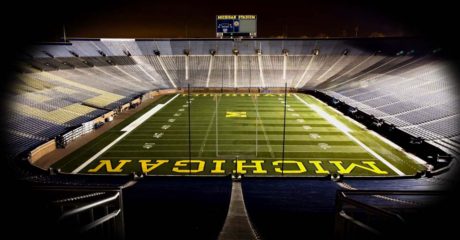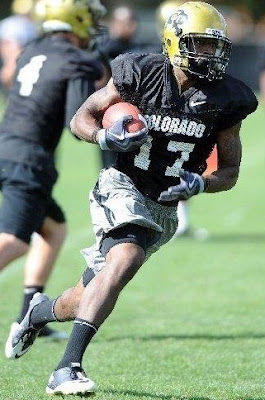In Defense of Morgan Trent
On the heels of reports from the Detroit Free Press, the NCAA launched an investigation into alleged infractions by Rich Rodriguez and his staff at the University of Michigan. On Monday night, the NCAA’s allegations were made known to university administrators. On Tuesday afternoon, the university held a press conference, at which both head coach Rich Rodriguez and soon-to-be athletic director David Brandon admitted making past mistakes. Also on Tuesday afternoon, former Michigan cornerback Morgan Trent was interviewed by the Detroit News and said the following:
“I’m not surprised because I know what happened, and I know what kind of rules were broken. I couldn’t see how they were going to get out of that.
“Whatever steps need to be taken (to restore Michigan’s winning tradition), I’m all for it. What is happening right now obviously is not working. I don’t know how long they’re going to let this last until changes are made. This year is going to be the tell-all what’s going to happen. We can’t have three losing years in a row. Not at Michigan. To lose seven of last eight games (in 2009) is an embarrassment.”
These comments immediately set off a firestorm in the Michigan blogosphere. In various places, I found quotes like “Morgan Trent is a piece of shit” (MGoBlog’s message board), “While you’re talking to the press Morgan, how bout telling us how Dwayne Jarrett’s ass tastes?” (Genuinely Sarcastic), and “[Morgan’s] father should have done us all a favor and pulled out. Or worn a rubber. Or punched your mother in the stomach” (a blog aptly named The Toolshed). Meanwhile, Trent was a sixth round pick of the Cincinnati Bengals and locked down their nickel cornerback job, making 28 tackles, 1 sack, and 4 pass breakups in his 2009 rookie season. If he’s “truly horrible at football” (another MGoBlog message board post), then put me down as somebody who wants to be truly horrible at football, too.
As I was reading these comments – and responding to some – I couldn’t help but feel disappointed in Michigan’s fan base. Not only are the allegations perhaps the biggest letdown of the Rodriguez era, but Wolverine fans came out of the woodwork to denigrate and attempt to discredit Trent by insulting his body of work at Michigan.
To briefly recap Trent’s career at Michigan, he was recruited in 2004 out of Orchard Lake St. Mary’s as a wide receiver. He switched to cornerback during bowl practices of his freshman year, during which he redshirted, and played sparingly as a redshirt freshman. He became a starter opposite Leon Hall in the 2006 season, taking part in an embarrassing Rose Bowl loss to USC and The Horror against Appalachian State in 2007. In Rodriguez’s first season at Michigan, 2008, Trent started the entire year at cornerback, but his solid – although not spectacular – play took a step back in the one-year experiment where cornerbacks coach/defensive coordinator Scott Shafer installed a failure of a defense, was neutered mid-season in favor of the 3-3-5 stack, and was promptly fired at the end of the season. It’s not a coincidence that Trent’s season as a fifth-year senior was a disappointment – he was undone by poor coaching and a poor scheme. Despite the poor coaching, he was named one of four team captains at the end of the season.
Trent finished his career as a 41-game starter, tallying 149 tackles, 7 interceptions, and 24 passes defensed. In addition, he did things like this (fast forward to 3:35) and this:
Now, should Morgan Trent have said the things he did? Probably not. Trent really added nothing that people didn’t already know, and if he thought about it, he surely would have known that such comments wouldn’t help Michigan’s precarious position in the local and national media.
But he spoke the truth.
I’m not surprised because I know what happened, and I know what kind of rules were broken. Trent played at Michigan during the 2008 season, when some of these allegations took place. He was there. He saw it. Even if he didn’t know at the time that rules were being broken, he’s an insider – he knows more than any fan could. He might remember grad assistant Alex Herron showing up to 7-on-7s. He might remember practices going for an extra 20 minutes.
I couldn’t see how they were going to get out of that. An infraction is an infraction is an infraction. You can’t go back and change history, no matter how much you want to do so.
Whatever steps need to be taken (to restore Michigan’s winning tradition), I’m all for it. What is happening right now obviously is not working. That’s true. It’s not. Michigan is 8-16 over the past two years and they’re on the verge of “major infractions” (the NCAA’s words, not mine).
I don’t know how long they’re going to let this last until changes are made. This year is going to be the tell-all what’s going to happen at Michigan. We can’t have three losing years in a row. Not at Michigan. This is a common sentiment amongst Michigan fans, media, and – let’s face it – people within the program. Nobody knows how long Rodriguez has to right the ship. Some think that another losing season would get him fired. Some think he should get at least four years. I’m sure incoming athletic director David Brandon ponders the same question; he’s been publicly supportive of Rodriguez, but he knows that Michigan can’t endure infractions and losing seasons forever.
To lose seven of last eight games (in 2009) is an embarrassment. Does anybody want to argue that losing to MSU, Illinois, and Purdue wasn’t embarrassing? How about the 45-24 loss to Wisconsin?
All the ire directed at Trent is a defense mechanism. After decades of admiring Bo Schembechler and his disciples, Gary Moeller and Lloyd Carr, Michigan fans cannot bring themselves to criticize the people who are truly to blame for what is happening right now at the University of Michigan – Rich Rodriguez and his staff.
A poster on MGoBlog said something to the effect that it makes him angry that “Haters are bringing down my Camelot.” Yes, the Free Press did some digging – much of it unethical – and jump-started the investigation. But the crux of the issue is that Rich Rodriguez broke the rules. He overscheduled practice times. His staff watched off-season 7-on-7s when they shouldn’t have. His staff punished players who skipped class. All of those things went against the rules that were put in place by the NCAA.
I’m not calling for Rodriguez to be fired. Far from it. Firing Rodriguez at this point would set the program even further back than it is. Barring any further infractions, he needs to keep his job through the 2010 season, and probably even 2011. But the tenuous hold he has on his job isn’t entirely due to outside forces. From the onset of his Michigan career, he was put in a tough position with the roster and personnel and media working against him, but this attack from the NCAA and the media falls squarely on his shoulders.
Michigan fans, your anger is misplaced. Be angry at the Detroit Free Press for the unethical ways they tricked young football players into answering their slick questions last summer. Be angry at the NCAA for having rules that student-athletes shouldn’t be punished for skipping classes. Be angry at Rich Rodriguez for letting things get out of control. Cancel your subscriptions, send letters, send e-mails. Let’s not lose perspective of who’s actually to blame.
Go Blue!




